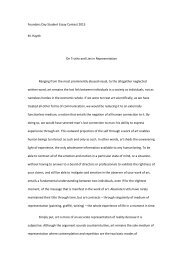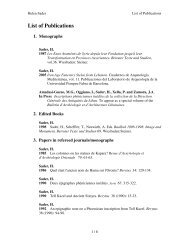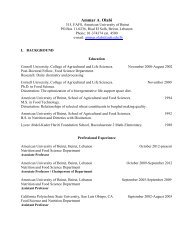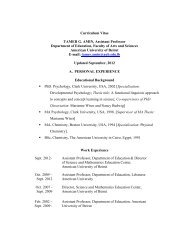The IX t h Makassed Medical Congress - American University of Beirut
The IX t h Makassed Medical Congress - American University of Beirut
The IX t h Makassed Medical Congress - American University of Beirut
You also want an ePaper? Increase the reach of your titles
YUMPU automatically turns print PDFs into web optimized ePapers that Google loves.
T h e I X t h M a k a s e d M e d i c a l C o n g r e s s<br />
POSTERIOR URETHRAL VALVES, CURRENT PERINATAL AND LONG TERM<br />
MANAGEMENT<br />
Alaa EL GHONEIMI, MD, PhD, FEBPS, FEAPU<br />
“Thrombosis, both venous and arterial, is a major cause <strong>of</strong> morbidity and mortality worldwide.<br />
Consequently, there is an ongoing search for new antithrombotic drugs, particularly novel<br />
anticoagulants. Recently, this armamentarium undergoes a major change with the introduction<br />
<strong>of</strong> new specific and oral anticoagulants that are likely to fulfil many <strong>of</strong> the unmet needs <strong>of</strong><br />
current warfarin and heparin therapies. A direct thrombin inhibitor, dabigatran etexilate, and<br />
a direct factor Xa inhibitor, rivaroxaban are actually marketed for an easier and safer venous<br />
thromboembolism prevention following orthopaedic surgery.<br />
Large ongoing trials try todemonstrate that these drugs would also simplify and optimize<br />
stroke prevention in atrial fibrillation, treatment <strong>of</strong> venous thromboembolism and prevention <strong>of</strong><br />
ischemic events in acute coronary syndrome. This presentation reviews the latest developments<br />
<strong>of</strong> new anticoagulants and focuses on those which have been approved or are in advanced<br />
development”.<br />
NEPHROPROTECTION IN PEDIATRICS<br />
Georges Deschênes M.D, Ph.D<br />
Nephroprotection is an advanced form <strong>of</strong> the conservative treatment <strong>of</strong> chronic renal failure that aims at<br />
preventing the progression <strong>of</strong> chronic renal disease to end stage renal failure, whatever the level <strong>of</strong> the<br />
glomerular filtration rate. All patients with a history <strong>of</strong> congenital or acquired renal disease that is known<br />
to decrease the nephron mass are concerned: congenital abnormalities <strong>of</strong> the kidney and urinary tract,<br />
polycystic diseases, chronic glomerular disease (Berger-Hinglais disease, Alport syndrome, membranous<br />
and membranoprolipherative glomerulonephritis, lupus nephritis and autoimmune vasculitis), acute<br />
and chronic haemolytic and uremic syndromes. In addition, nephroprotection also concerns patients<br />
with a systemic disease potentially affecting the kidney: diabetes mellitus, sickle cell disease, metabolic<br />
syndrome, essential hypertension, obesity and also history <strong>of</strong> low birth weight for term.<br />
Chronic renal disease is now classified according to the level <strong>of</strong> glomerular filtration rate: Stage 1: ><br />
90 ml/min/1.73 m²; Stage 2: 60-90 ml/min/1.73 m²; Stage 3: 30-60 ml/min/1.73 m²; Stage 4: 15-30 ml/<br />
min/1.73 m²; Stage 5 < 15 ml/min/1.73 m² representing end stage renal failure. <strong>The</strong> most determinant<br />
factors <strong>of</strong> progression <strong>of</strong> renal disease are proteinuria/microalbuminuria and hypertension that<br />
have to be both carefully controlled using drugs modifying the renin-angiotensin-aldosterone<br />
axis. Inhibitors <strong>of</strong> angioconvertase (ACEi) and antagonists <strong>of</strong> the angiotensin-2 receptor (ARA-<br />
2) have definitely proven their efficiency to prevent the progression or chronic renal disease.<br />
<strong>The</strong> targets <strong>of</strong> these therapies are to maintain the blood pressure at the 50 th percentile and the<br />
level <strong>of</strong> microalbuminuria below 3 mg/mmol <strong>of</strong> urine creatinine. Other factors able to aggravate<br />
the status <strong>of</strong> chronic renal disease include anemia, carbohydrate intolerance, hyperuricemia<br />
and dyslipidemia. Anemia has to be controlled by supplements in iron, vitamine B6 and B12,<br />
and erythropoietic stimulating agents, carbohydrate intolerance by a specific diet and insulin id<br />
needed, hyperuricemia by administration <strong>of</strong> allopurinol and dyspipidemia by the administration<br />
<strong>of</strong> statins. Of note, 1/ chronic renal disease and most <strong>of</strong> the associated factors <strong>of</strong> progression to<br />
renal failure are also factors at risk <strong>of</strong> cardiovascular disease in the adult age; 2/<br />
Drugs used to control the progression <strong>of</strong> chronic renal disease are also efficient to prevent the<br />
cardiovascular risk at adult age.<br />
72
















